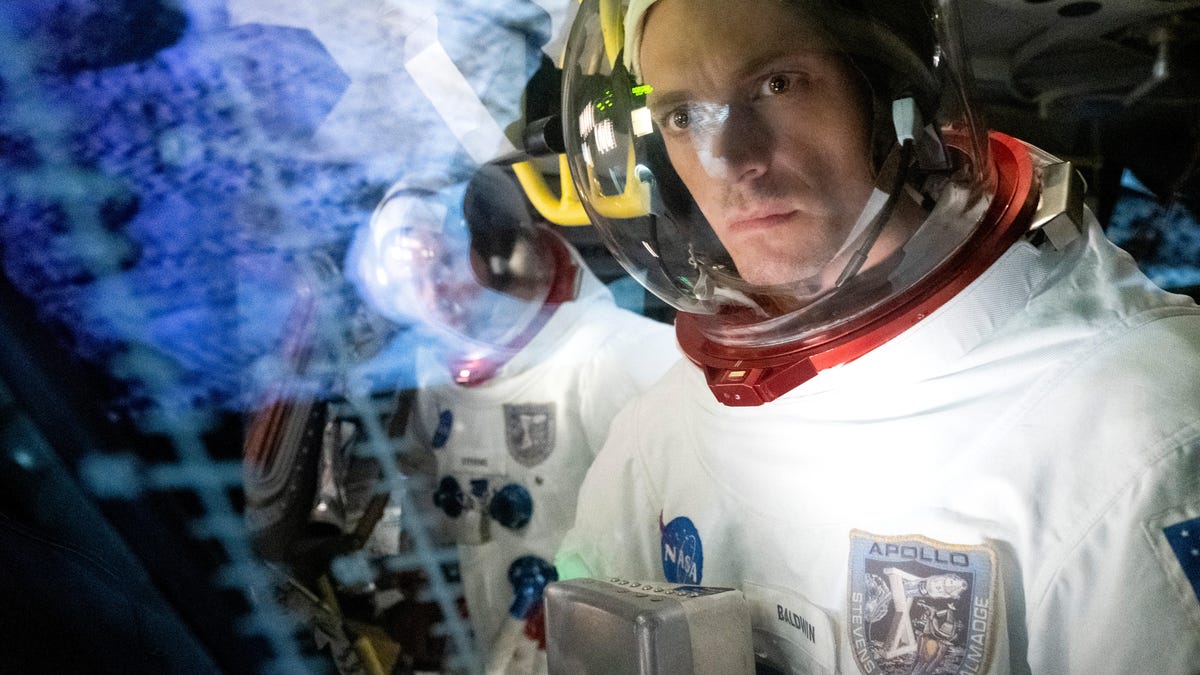Star of Apple TV Plus space show thinks movies could help us get to Mars
In For All Mankind, Joel Kinnaman plays a fictional Apollo astronaut amid a never-ending space race.

Joel Kinnaman plays astronaut Edward Baldwin.
Races usually end. In new Apple TV Plus drama For All Mankind, though, the space race never did. The series takes us back to a pivotal moment in history, when people around the world gathered to watch a man set foot on the closest celestial body. Only, in this version the first astronaut on the lunar surface was a Soviet cosmonaut. While that might've been a blow for the US in the show, it also meant efforts to explore space would stay ramped up.
"Because the space race was this crisis project, after we won, it just ended, and many people felt like the promise wasn't delivered," says actor Joel Kinnaman, who plays the upright but closed-off astronaut Edward Baldwin. "Our show explores the 'what if' but also 'what still could be.'"
Kinnaman, who you might know from Altered Carbon, Suicide Squad and The Informer, talked with me about portraying a fictional Apollo astronaut, changing history, and using TV and film to get humans to Mars.
Here's a lightly edited transcript of our conversation.
Q: Over the years, we've had some iconic movies about the space race, from The Right Stuff to First Man. In prepping for this show, did you seek those out?
Kinnaman: From interviews with real guys who have gone through the same thing, to test pilots, there was a ton of research and prep material to dive into. And I really enjoyed diving into it and getting a more in-depth understanding of what these guys actually did. It's pretty remarkable. But then, of course, when our show starts moving, we move fairly quickly into this alternate timeline where all the events are what could have been. The foundation of our characters comes from the reality that we know, but then they venture into this unknown world we're creating.
You play Edward Baldwin, a contemporary of Neil Armstrong and his colleagues. Could you talk about finding this character who exists among these legendary figures?
It's pretty interesting because these big, real-life characters, like Neil Armstrong ... take a peripheral role in our story, initially, as the fictional characters step into the forefront. One of the things I really loved about [my] character is that he's a man of his time, and at first glance, he's this classic American hero. And that's also the face he shows the world. But then because this is really good writing, there are a lot of cracks in that facade. He's dealing with issues like anger management. What really drew me to this character is ... he has to deal with this ultimate tragedy and this incredible emotional challenge, and it's a person who doesn't deal with emotions; he keeps his emotions bottled up. So I thought that is really interesting to play -- how a guy like that deals with this incredible emotional shock.
Looking at stories of what drove humans to reach for the moon, these days I can't help but think about the push toward Mars. Do you think
TV and movies
have a role in getting people excited about space exploration, or even managing expectations?
Our imagination is one of our strongest driving forces, and also one of the strongest driving forces of our evolution. TV and film definitely play into that. When it comes to space exploration ... these programs are expensive and they need funding, and for politicians to award them funding, there has to be a public appetite for it. With films and TV, when we can show what it possibly could do for us, that unifies us, and any movement in society that drives innovation and our adventurous spirit, that is not sectarian or tribal, but actually unifying for us as a species, I think that's a positive thing. If TV and film can help drive the appetite and the lust for that, I think it can actually play a real role in getting more people interested and getting funding for it.
Since the show is on an alternate timeline, historical differences pop up. Do you have a favorite alternate event?
I love that the Vietnam War ended earlier. It's one of the most frustrating and painful events in American history that the Vietnam War just kept on going. Everyone wanted to end the Vietnam War and still they were just mired in that conflict, this political indecision that just led us to continue to wreak havoc on Vietnam and have Americans and Vietnamese die unnecessarily. Our show creates this cover where because we're reaching into space and we have to double down on our focus there, that gives us the reason to wind down the war five years earlier. In the second season, all that stuff is really escalating. The shows starts out as this Mad Men-esque drama in the NASA world, but by the second and third season, it's like this real-world creation of a new world that is really cool.
If you had the chance, would you go to space?
For sure. I would just love to see Earth from a distance. When I was preparing for this, I read and watched so many interviews with astronauts, and that was something so many of them spoke about, seeing Earth from a distance, this little blue orb in this vast sea of vast darkness, and it was something that changed them. It made all the conflict and the stuff they were going through feel so petty, and also makes it so important to take care of it.
Originally published Nov. 14, 5 a.m. PT.

